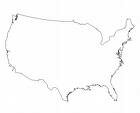Observing US: A column about America, by Marylaine Block originally published by Fox News Online, 1998-2000 |
 |
Observing US: A column about America, by Marylaine Block originally published by Fox News Online, 1998-2000 |
 |
#56, October 12, 1999
A GAME OF LEAPFROG
by Marylaine BlockI can remember when the presidential campaign didn't begin until March of the year of the election, when New Hampshire held the first primary. Things ambled along at a leisurely pace through July or August, when the conventions were held. Only after Labor Day did serious campaigning begin and voters start paying attention.Judging from the recent Pew Center poll which found that 54% of Americans couldn't name a Democrat running for President, and 46% couldn't recognize George W. Bush as a Republican candidate, it appears that voters are still on the "pay attention after Labor Day" calendar. Politicking, however, is moving ever earlier into the campaign year.
This is partly the result of party changes intended to give voters a voice in selecting candidates for office. Now every state has either caucuses or primaries which determine how its votes will be cast at the Republican and Democratic conventions. This has effectively turned conventions into coronations of already-chosen candidates.
Many state party officials, noting enviously that New Hampshire's early date made it a "kingmaker," set their primary dates in late February. This meant New Hampshire had to move its primaries into early February, because state law requires them to hold their primary a week before any other state's. When Delaware set its primary for February 8, New Hampshire's primary moved to February 1. Since Iowa law requires that its presidential caucuses be held 8 days before the New Hampshire primary, its caucus date, already moved forward to January 31, presumably will move yet again to January 24 or earlier.
California, finding that presidential candidates had already been chosen by the time of their traditional June primary, moved it ahead to March. So did seventeen other states. This means that 75% of the American population will have had a chance to choose their candidate by the first week of March -- weeks before the campaign season used to sluggishly begin, and months before most of us are even aware of the candidates' names, let alone their positions. It could get sillier still, as states continue to pursue the competitive advantage of being first - New Hampshire just passed a law allowing them to move their primary into the year before the election, if necessary.
The states' game of leapfrog has had drastic and damaging effects on the electoral process. Compressing the schedule into two months turns the campaign into an endurance contest reminiscent of the old dance marathons. It practically guarantees that only the best funded candidates will survive, because they have to campaign in multiple states simultaneously with television ads. Not only will candidates not have a chance to become intimately familiar with the needs of ordinary voters, they may not even MEET ordinary voters, because they will have to spend their time courting donors and making TV spots.
There has to be a more rational way of selecting a President, that spreads things out over just 4-5 months, demands less stamina from the candidates, allows them to meet real live voters, and allows other states a shot at "first in the nation."
One solution might be the rotating regional primary recommended by the National Association of Secretaries of State, which has the merits of fairness and reduced jet lag for the candidates.
My solution is for the political parties to jointly conduct a lottery two years before each presidential election to randomly assign primary dates among the 50 states, and spread them evenly between February and June so that no candidate needs to work more than 3 states each week.
If we give every state the opportunity to be first, all Americans will have a chance to make their opinions of the candidates matter. Instead of candidates discussing the price of corn and home heating oil, as they now do in Iowa and New Hampshire, let them talk with environmentalists and laid-off lumberjacks in Oregon, Nevadans who don't want to store the nation's nuclear waste, or elderly Floridans who don't want big government messing with Medicare. Give every candidate a chance to work just one small state thoroughly, early, and cheaply. Give every state a chance to bask in the attention of network news.
Everybody would win. Not only would my approach offer genuinely equal opportunity, we also wouldn't have to listen to pollsters and pundits until February.
Read the rest of
these columns
HEREMarylaine.com
home to all my
other writing